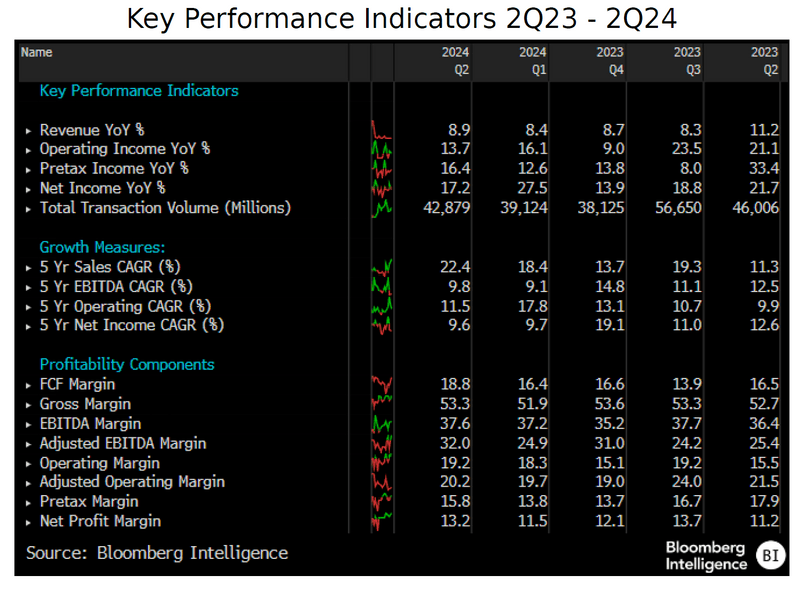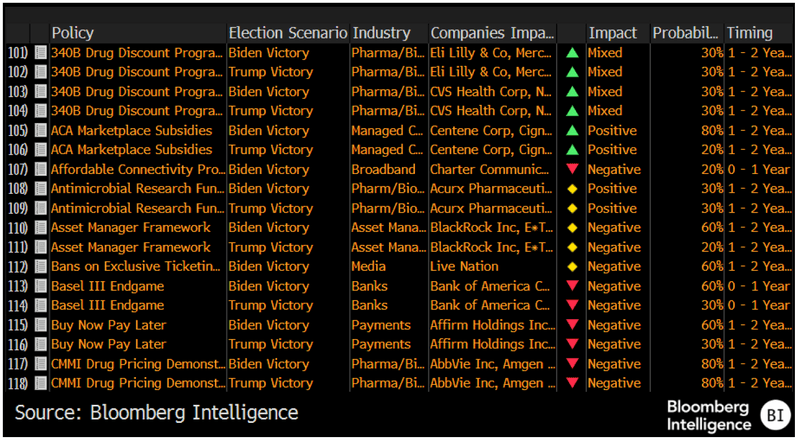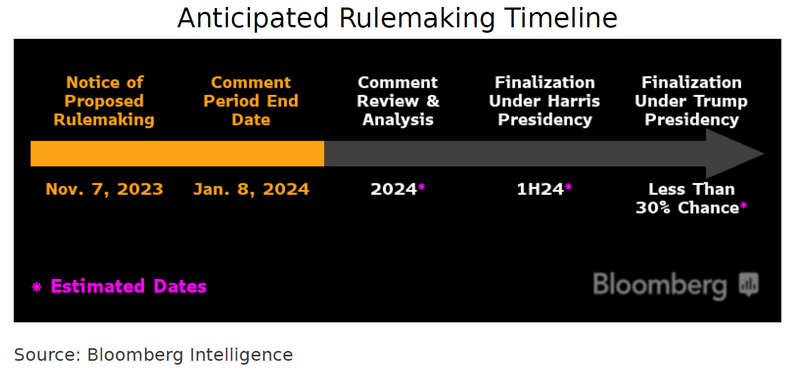ARTICLE
Meta, Google, fintechs could face more scrutiny in CFPB proposal

Bloomberg Intelligence
This analysis is by Bloomberg Intelligence Senior Government Analyst Nathan Dean. It appeared first on the Bloomberg Terminal.
With the CFPB’s constitutionality status secured, the bureau will likely aim to finalize its proposal on fintech in the near term. Yet we think the CFPB may have to wait until after the US elections to do so. That also depends on whether Vice President Kamala Harris wins. If former President Donald Trump wins, we think the rule will be delayed. Some potential tweaks — like the definition of a large participant — are feasible.
Our thesis: Meta, Google and other companies offering digital wallets and payment apps may come under CFPB supervision, increasing compliance costs and demands, if a 2023 proposal proceeds. Though the plan appears manageable for the industry, it might open the way for a debate on whether large fintech firms are a systemic risk. That designation could bring capital requirements and other hurdles.
What’s at stake?
Compliance headaches, for now.
CFPB scrutiny over technology companies involved with consumer payments may ratchet up regulatory demands in the short term. The first step if the 2023 proposal is finalized would likely be to answer inquiries from the agency and to host examiners on site. Compliance spending is likely to increase as a result. We believe the CFPB is most interested in determining whether these companies are adhering to US law in areas such as data collection and customer finances. Many of these operations — such as Meta, Google and Apple — would have the financial resources to make any needed changes. But it’s also possible that the CFPB, upon seeing areas that it thinks need correction, could push for changes to business processes, demand customer restitution or take enforcement actions.

But… Systemic-risk threats are brewing.
If Harris wins in November, a debate may emerge in the next few years over whether large fintech firms pose a systemic risk to the US financial system. CFPB Director Rohit Chopra hinted as much in an October 2023 speech. A systemic-risk designation — also known as being a nonbank SIFI — could result in regulatory measures such as capital requirements to safeguard companies against failure. Yet this plan would likely take years to implement and need extensive study before a decision is made. A Trump victory could negate this risk.
What’s the outlook?
70% chance of finalization in 2025 if Harris wins.
Though we previously assumed the proposal was a high enough priority to come out before the November election, given the vote is less than a month away, it’s more likely the rule will have to wait for the results. If Harris wins, we think Chopra will aim to finalize it — probably with only a few changes — in 1H. Should Trump win, new CFPB leadership will likely at least hit pause on the rule’s timeline as new priorities and agendas are set. If scrutiny of the tech sector remains high under a Trump presidency, there’s a chance new leadership could reassess the proposal, but that’s still to be determined.


What’s the timeline?

What’s the issue?
Payments, fintech scrutiny.
The CFPB proposal would expand the definition of “large participants” under the bureau’s examination authority to include tech firms involved with consumer payments, as an initial step toward increasing scrutiny of certain technology companies, we believe. The CFPB in 2021 sought information from Apple, Amazon, Meta, Google, PayPal and Square to learn more about how firms are handling customer financial data. The CFPB has concerns that tech companies entering the payments business — and their ability to collect and monetize personal data — may be straying from US consumer laws. The proposal is only applicable to companies with more than 5 million transactions per year.
Policy action:
- CFPB Proposes New Federal Oversight of Big Tech Companies and Other Providers of Digital Wallets and Payment Apps, Nov. 7, 2023
- “CFPB Orders Tech Giants to Turn Over Information on their Payment System Plans”, Oct. 21, 2021
Impacted firms:
- Fintech including Amazon, Apple, Meta, Google, PayPal, and Square.
The data included in these materials are for illustrative purposes only. The BLOOMBERG TERMINAL service and Bloomberg data products (the “Services”) are owned and distributed by Bloomberg Finance L.P. (“BFLP”) except (i) in Argentina, Australia and certain jurisdictions in the Pacific Islands, Bermuda, China, India, Japan, Korea and New Zealand, where Bloomberg L.P. and its subsidiaries (“BLP”) distribute these products, and (ii) in Singapore and the jurisdictions serviced by Bloomberg’s Singapore office, where a subsidiary of BFLP distributes these products. BLP provides BFLP and its subsidiaries with global marketing and operational support and service. Certain features, functions, products and services are available only to sophisticated investors and only where permitted. BFLP, BLP and their affiliates do not guarantee the accuracy of prices or other information in the Services. Nothing in the Services shall constitute or be construed as an offering of financial instruments by BFLP, BLP or their affiliates, or as investment advice or recommendations by BFLP, BLP or their affiliates of an investment strategy or whether or not to “buy”, “sell” or “hold” an investment. Information available via the Services should not be considered as information sufficient upon which to base an investment decision. The following are trademarks and service marks of BFLP, a Delaware limited partnership, or its subsidiaries: BLOOMBERG, BLOOMBERG ANYWHERE, BLOOMBERG MARKETS, BLOOMBERG NEWS, BLOOMBERG PROFESSIONAL, BLOOMBERG TERMINAL and BLOOMBERG.COM. Absence of any trademark or service mark from this list does not waive Bloomberg’s intellectual property rights in that name, mark or logo. All rights reserved. © 2024 Bloomberg.